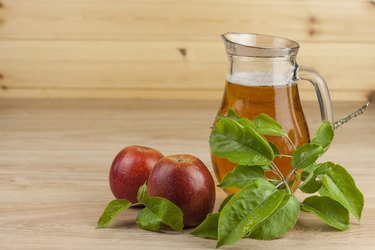
Forget the kind you drank in kindergarten -- for grown ups, apple juice is a secret flavor weapon, flavoring everything from pork chops to smoothies. But it can be confusing to distinguish between the myriad varieties of juice and cider that look and taste like apples. Understanding the basic differences between apple juice and apple cider will help you make appropriate substitutions.
Know the Difference
Video of the Day
Apple juice and apple cider are basically the same, except apple cider is thicker, containing more pulp and sediment. Apple juice typically contains extra sugars. Both are made by coring, chopping and mashing apples to extract their juices. In the case of apple juice, this pulpy substance is filtered and the juice is mixed with preservatives and sweeteners. As a result, apple cider has more complex, slightly bitter flavor compared to apple juice. Both cider and juice typically undergo a process of pasteurization to make them safe.
Video of the Day
Make Smart Substitutions
"Cook's Illustrated" says apple juice never makes a good substitute for apple cider, due to its sweetness. If you disagree with this, you can use them interchangeably and make the appropriate adjustments. To accommodate for the extra sugar in apple juice, reduce the sugar in your recipe, add something acidic, such as lemon juice or apple cider vinegar, or use unsweetened apple juice. You can also mix apple juice with a small amount of applesauce to make up for the difference in texture.
Add Flavor to Desserts
Because it's sweeter, substituting juice for cider works well in desserts. You can make sweet applesauce by placing peeled and chopped apples in a large pot with several spoonfuls of apple cider or juice. Simmer the mixture until the apples are tender, puree it in a food processor and season with butter, brown sugar, cinnamon and ground ginger. Or use apple juice to make stewed, hot fruit and serve over ice cream. Apple juice and apple cider both work in apple-flavored cookies, apple crisps and glazes for quick breads or cupcakes.
For Drinks and Spreads
Apple juice and apple cider work equally well as the foundation for richer, homemade drinks, since you will be thickening and flavoring the mixture anyway. This applies to apple smoothies, apple iced teas, apple shakes, mulled apple cider or apple punch. In addition, you can use juice or cider to make apple-flavored butters or cheese spreads. You can easily make hot apple cider by simmering store-bought cider or juice with cinnamon sticks, cloves, brown sugar, nutmeg, cardamom and orange zest.